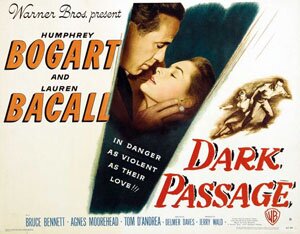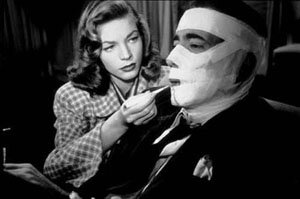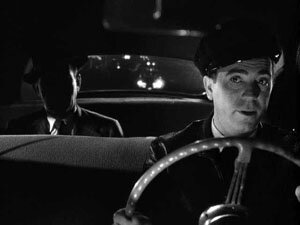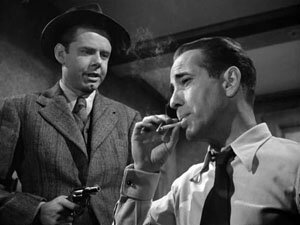Among the many fascinating and, in this case, amazing things about The Maltese Falcon is that it was the first film for Sydney Greenstreet who was 62 years old at the time. Can you imagine any actor today getting a role, much less starting a career at 62?
Film noir doesn’t always mean good: Dark Passage
It’s Day 6 of For the Love of Film (Noir) — don’t forget to or use the button on the right. And if you are interested in boatloads of great links to musings on film noir and its films, scroll down this page at Self-Styled Siren or over at Ferdy on Films. This is wonderful material!
As much as I like movies in the film noir category, particularly those from the forties and fifties, the term is not a synonym for good. As with any type of movie — screwball, romance, western, drama — it has its clunkers.
Of course, everything is subjective. As you’ll read below, I don’t have a high opinion of Dark Passage. Maybe the problem isn’t the movie but me. To be fair, there is this review over at Noir of the Week. As for mine …
 Dark Passage (1947)
Dark Passage (1947)
Directed by Delmer Daves
Of the four movies Humphrey Bogart and Lauren Bacall made together, Dark Passage is easily the weakest. (Their other movies together were To Have and Have Not, The Big Sleep, and Key Largo.) It’s a film noir that has what it thinks is a neat idea — the first third of the movie uses a “first-person” camera, meaning the central character is the camera viewpoint.
But it falls flat.
In fact, the gimmick pretty much ruins the film because we don’t get to see (and therefore connect with) Humphrey Bogart’s character. In the first third, we don’t see him period. He is the camera viewpoint. In the second third, his head is bandaged (due to plastic surgery to alter his identity).
We don’t actually see Bogie till a large chunk of the movie is over. By the time we do, we’re bored.
 Bogart plays a character wrongly accused and convicted of murder. The movie opens with his escape. On the run, he is rescued by Lauren Bacall’s character. (Everyone Bogart runs into in the movie conveniently has some connection to the story.)
Bogart plays a character wrongly accused and convicted of murder. The movie opens with his escape. On the run, he is rescued by Lauren Bacall’s character. (Everyone Bogart runs into in the movie conveniently has some connection to the story.)
A helpful cab driver later recommends a shady plastic surgeon to Bogart’s character. Bogart gets his face changed then goes off in search of the criminals who framed him so he can prove his innocence.
Despite trying, the movie never gets very interesting. For one thing, there is very little to relieve the darkness of the noir approach. There is also little chemistry between Bogart and Bacall and this is largely because they play so few scenes together, at least in the first two thirds.
The characters do have scenes, but since Bogart isn’t physically in them (because of the camera viewpoint or because his head is wrapped in bandages and he can’t talk), the Bogie-Bacall magic is absent.
 The other problem are the improbable conveniences mentioned above — the helpful cab driver, a guy who picks up Bogart when he is hitchhiking, Bacall’s appearance. It’s all a little too improbable.
The other problem are the improbable conveniences mentioned above — the helpful cab driver, a guy who picks up Bogart when he is hitchhiking, Bacall’s appearance. It’s all a little too improbable.
The only time we get a sense for an interesting story is at the very end when Bogart and Bacall have fled to South America. Suddenly the heavy handed noir atmosphere is relieved and we get something that has more of the atmosphere of Casablanca or To Have and Have Not.
It seems clear that the movie has misread what made Bogart and Bacall so interesting together. It certainly misreads Bogart.
 Despite the success of movies like The Big Sleep and The Maltese Falcon, it wasn’t the noir genre that made Bogart popular. It was that he was playing a flawed romantic hero within them.
Despite the success of movies like The Big Sleep and The Maltese Falcon, it wasn’t the noir genre that made Bogart popular. It was that he was playing a flawed romantic hero within them.
In Dark Passage he simply plays a schmuck floundering around trying to prove his innocence. He doesn’t play a strong character. If anything, the character is rather weak.
And so we end up with a tedious movie, one that relies on a gimmick rather than the power Bogart and Bacall could bring to the screen.
They are wasted in this movie.
On Amazon:
- Dark Passage
- Bogie and Bacall – The Signature Collection (includes: The Big Sleep, Dark Passage, Key Largo and To Have and Have Not)
Dark Passage: a waste of Bogie and Bacall?
I just did some housecleaning on Piddleville. I more or less cleaned up some code and design on a few reviews that were in a very old Piddleville format.
While doing so, I came across a few Bogie and Bacall movies, including 1947’s Dark Passage which, as it turns out, I apparently didn’t care for. Here’s the review:
Dark Passage
Directed by Delmer Daves
 Of the four movies Humphrey Bogart and Lauren Bacall made together, Dark Passage is easily the weakest. (Their other movies together were To Have and Have Not, The Big Sleep, and Key Largo.) It’s a film noir that has what it thinks is a neat idea — the first third of the movie uses a “first-person” camera, meaning the central character is the camera viewpoint. But it falls flat.
Of the four movies Humphrey Bogart and Lauren Bacall made together, Dark Passage is easily the weakest. (Their other movies together were To Have and Have Not, The Big Sleep, and Key Largo.) It’s a film noir that has what it thinks is a neat idea — the first third of the movie uses a “first-person” camera, meaning the central character is the camera viewpoint. But it falls flat.
In fact, the gimmick pretty much ruins the film because we don’t get to see (and therefore connect with) Humphrey Bogart’s character. In the first third, we don’t see him period. He is the camera viewpoint. In the second third, his head is bandaged (due to plastic surgery to alter his identity).
We don’t actually see Bogie till a large chunk of the movie is over. By the time we do, we’re bored.
 Bogart plays a character wrongly accused and convicted of murder. The movie opens with his escape. On the run, he is rescued by Lauren Bacall’s character. (Everyone Bogart runs into in the movie conveniently has some connection to the story.)
Bogart plays a character wrongly accused and convicted of murder. The movie opens with his escape. On the run, he is rescued by Lauren Bacall’s character. (Everyone Bogart runs into in the movie conveniently has some connection to the story.)
A helpful cab driver later recommends a shady plastic surgeon to Bogart’s character. Bogart gets his face changed then goes off in search of the criminals who framed him so he can prove his innocence.
Despite trying, the movie never gets very interesting. For one thing, there is very little to relieve the darkness of the noir approach. There is also little chemistry between Bogart and Bacall and this is largely because they play so few scenes together, at least in the first two thirds.
The characters do have scenes, but since Bogart isn’t physically in them (because of the camera viewpoint or because his head is wrapped in bandages and he can’t talk), the Bogie-Bacall magic is absent.
The other problem are the improbable conveniences mentioned above — the helpful cab driver, a guy who picks up Bogart when he is hitchhiking, Bacall’s appearance. It’s all a little too improbable.
The only time we get a sense for an interesting story is at the very end when Bogart and Bacall have fled to South America. Suddenly the heavy handed noir atmosphere is relieved and we get something that has more of the atmosphere of Casablanca or To Have and Have Not.
It seems clear that the movie has misread what made Bogart and Bacall so interesting together. It certainly misreads Bogart.
Despite the success of movies like The Big Sleep and The Maltese Falcon, it wasn’t the noir genre that made Bogart popular. It was that he was playing a flawed romantic hero within them.
In Dark Passage he simply plays a schmuck floundering around trying to prove his innocence. He doesn’t play a strong character. If anything, the character is rather weak.
And so we end up with a tedious movie, one that relies on a gimmick rather than the power Bogart and Bacall could bring to the screen.
They are wasted in this movie.
On Amazon:
- Dark Passage
- Bogie and Bacall – The Signature Collection (includes: The Big Sleep, Dark Passage, Key Largo and To Have and Have Not)
Does the world need another Casablanca review?
The answer is no. So think of this as rambling. It is, after all, kind of a shambling, all over the place kind of thing.
Casablanca (1942)
Directed by Michael Curtiz
What it the world do you write about Casablanca? And why would you? I suppose if I were possessed of some brilliantly critical mind that, after much groaning and mulling and sleepless nights, I might come up with some unusual insight but, given my limited cognitive abilities, that ain’t going to happen.
Yet every time I watch Casablanca, which is often, I think, “I should write about this.” I think that’s because I’ve written about quite a few movies and the list seems somehow incomplete with Casablanca not there. But I really don’t have anything to add that isn’t, at best, redundant.
I can say this though (and it’s the same thing I said about The Philadelphia Story), apart from the fact that everything that can be said about Casablanca has probably been said, I really can’t “review” the movie because whenever I watch it, within about thirty seconds of it starting, my critical faculties are off. I’m into the stream (or dream, if you prefer) of the movie. I just sit there and watch it. Enjoy it.
Bogart isn’t Bogart. He’s Rick. Bergman isn’t Bergman. She’s Ilsa. Henreid is Laszlo. Claude Rains is Captain Renault.
Okay, although Peter Lorre plays Ugarte he’s still Peter Lorre. So there’s one exception.
The point is, the movie is so easily engaging I find it impossible to think about shots, edits, lighting, structure … anything. I just flow with the film and watch it play out, loving every moment. The actors aren’t their celebrity personas; they are the characters they’re playing.
I still don’t know how they made a movie this good. Mind you, no one else does either so I’m not alone.
I find it interesting that when I think of the movie I don’t think of it as art, though it is that. I think of it as an exceptional example of craft. I think that, if anything, is the secret of its success. Regardless of what the job was –director, writer, actor, lighting, whatever – whomever was doing that job brought their best. And there must have been some kind of happy synergistic effect.
(Yes, I’m speculating. As mentioned, I’ve no clue how they managed to make such a great film.)
I also have a theory: the best movies always tell love stories, though the love story doesn’t dominate the film. In Casablanca, as others have discussed, there’s romance, intrigue, mystery, suspense, action … the “usual suspects.” But it’s the love story, the romance, that hooks people and is what they remember.
The danger of a love story is sentimentality. Here, in Casablanca, that’s mitigated by the cynical humour, which itself is mitigated by the romance. Rick (and Captain Renault) are cynical but, as the Captain notes, it disguises a romantic. So the dark aspects of the cynical humour aren’t as harsh and unpalatable as they often are in contemporary stories where they aren’t mitigated. Black is black and largely disagreeable.
Contrary to Kurt Vonnegut’s observation that, “You are what you pretend to be,” in Casablanca none of the primary characters are what they pretend to be. Rick and Renault aren’t the hard-bitten cynics they pretend they are and Ilsa, who pretends to love Laszlo, in the end admits (as we already knew) that she really loves Rick.
What I’m trying to get around to saying is that, while a love story and, yes, sentimental, the sentimentality that kills so many other attempts at this sort of thing never quite gets out of hand. It’s tempered throughout by the humour (and a few other elements). And that humour, largely dark and cynical, is never overwhelming because the romance tempers it.
Somehow, a fine balance is struck.
And so, I’ll watch this movie again and again and again. And also again and again and again, I’ll scratch my head and wonder how it got made and why it works so damn well.
Perhaps, as they say in Shakespeare in Love, “It’s a mystery.”


